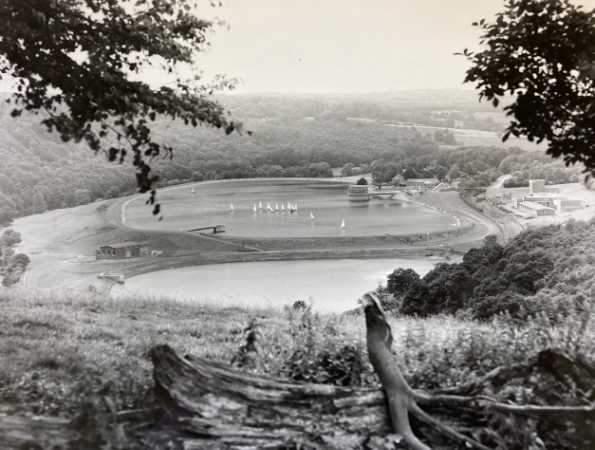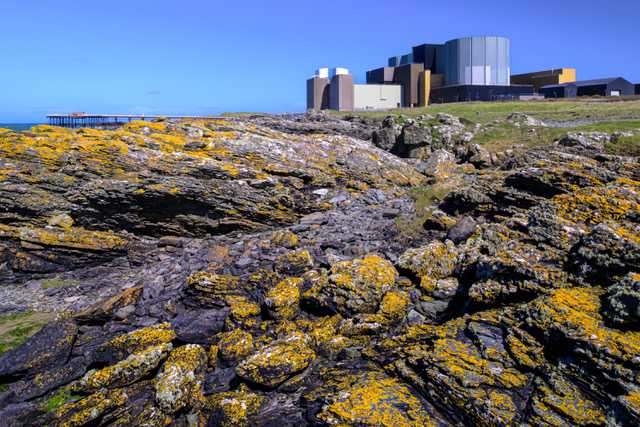Current PhD students
Discover some of the research being undertaken by the PhD candidates in the Urban Form and Social Space cluster.
|
Image: Photograph of Trimpley Reservoir from the Brenda Colvin Collection at the Museum of English Rural Life, University of Reading |
Josephine SweeneyPhD title: Landscape of Post-War Reservoirs: Environment, Conservation and PerceptionSupervisors: Professor Luca Csepely-Knorr, Guy Baxter (Museum of English Rural Life), Professor Richard Brook (University of Lancaster) Overview: Reservoir landscapes embody complex negotiations between political, social and ecological conditions, engineering economies and architectural approaches. My research explores these negotiations and their temporal qualities, including for example memories of drowned land and prospections of water scarce futures. I will interrogate how notions of ‘rural’ landscape manifested in the landscape architectural designs of post-war reservoirs, and situate their construction within the changing socio-political context of the British Welfare State. This is a Collaborative Doctoral Award in partnership with the Special Collections and Archives at the Museum of English Rural Life (MERL). Using visual and participatory research methods I will bring archival materials held at the MERL (including the drawings, photographs and letters of landscape architects, alongside the collections of organisations such as the Council for the Protection of Rural England and the Campaign for National Parks) into dialogue with communities that inhabit and/or rely upon reservoir landscapes. By drawing together archival representations, community memory and everyday experience my research will consider the ongoing impact of reservoir landscape architectural design on contemporary understandings of landscape, heritage policy and community use today. |
|
Image: Wylfa Magnox Station, as seen from Porth-y-pistyll Bay, demonstrates Dame Sylvia Crowe’s meticulous boundary treatments. The stone walls and layered landscape draw the surrounding terrain seamlessly to the edge of the reactor buildings. The building’s colour palette, devised by Crowe, was carefully chosen to harmonise with the wider landscape. |
Peter WilliamsPhD Title: Landscapes of Atomic Optimism: Exploring the Past, Present, and Future of Energy Infrastructure through Visual Inquiry Supervisors: Professor Luca Csepely-Knorr, Dr. Yat Shun Kei, Professor Richard Brook (Lancaster University) My research investigates Dame Sylvia Crowe’s groundbreaking landscape designs for the Central Electricity Generating Board (CEGB) during the development of Britain’s first-generation civilian nuclear power stations. Focusing on the sites of Bradwell, Trawsfynydd, and Wylfa, this study traces the evolution of these landscapes over six decades, contextualising their historical significance and contemporary relevance in the push for a zero-carbon future. Using photography as a method of visual inquiry, I aim to uncover how Crowe’s designs responded to the monumental challenges of integrating large-scale infrastructure within the British landscape. This research examines the influence of these landscapes on government policy, the profession of landscape architecture, and their enduring cultural and environmental legacy. By incorporating international comparisons with similar programmes in France and Germany, I highlight the role of landscape architecture in shaping the narrative of energy infrastructure. This study seeks to deepen understanding of Crowe’s enduring influence and the evolving relationship between energy, landscape, and societal values.
|
|
Image: A Street Corner Space in Old City-centred Neighbourhood, Guangzhou, Source: Visual China Group 2020 |
Hao DengPhD Title: An Everyday Urbanism Approach to Urban Design of Cultural Quarters in China Overview: This project explores the (re)production of urban spaces in cultural quarters through the perspective of Everyday Urbanism. The cultural quarters selected in this research are developed following a ‘Culture-led Urban Regeneration’ (CUR) approach in China. The research aims to understand the contest between planning strategies of the local authority or elites and the tactics of ordinary citizens in the urban spaces. It pays particular attention to street corners as this type of space has converging flows of people and diverse ‘everyday culture’. The research intends to make a contribution to the design and planning of cultural quarters to support people’s daily lives and place-making. |
 |
Khalid BazughayfanPhD Title: Design for environmental sustainability: comparative study of two design governance mechanisms in Saudi Arabia Supervisors: Fei Chen, David Chow Overview: This project explores the planning systems in Saudi Arabia and the management of design issues that are related to environmental sustainability in these systems. Two design governance mechanisms can be identified in Saudi Arabia. One is the private-led Economic City Authorities which control the King Abdullah Economic City (KAEC), and the other is led by the crown and the government. The former is particularly effective in promoting environmental sustainability. The project aims to understand the similarities and differences between the two systems with regards to regulations, strategies and approaches of urban design and planning. Key obstacles, challenges, strengths and weaknesses of the systems will be identified. Lessons will be drawn from each system to improve them in the future. The outcome of the project will enable more effective design management for sustainability in Saudi cities and communities. |
|
Image: Aerial view of George Town World Heritage Site, Malaysia. Source: Derrick Lim/ Shutterstock.com |
Aufa Abd RahmanPhD Title: Design Governance in Heritage-led Urban Regeneration : the case of George Town World Heritage Site, Malaysia Supervisors: Fei Chen, Junjie Xi Overview: Cities are increasingly embracing culture as a catalyst for urban development. This culminates in heritage-led urban regeneration of historic urban areas. To ensure that cities remain resilient while retaining their cultural identities, urban regeneration must be planned with a clear understanding of design issues and stakeholder relationship in the process. The case of George Town offers a unique context that represents this process of the involvement of stakeholders with varying cultural values and visions in the preparation of conservation and management plans. These local and international entities collaborate on multiple design and conservation activities within the city's informal decision-making environment and the formal planning system. The purpose of the study is to investigate how stakeholders address design challenges through various types of conservation plans and other planning instruments to facilitate George Town's urban regeneration following its 2008 inscription. This study will advance our understanding of design governance in historic cities within the Malaysian planning structure and systematically enhance design quality in order to achieve sustainable development. |
|
Image: Aerial views of Cape Town and Melbourne. Modern high rise cities with parks in the middle of the photographs. |
Xicheng LiPhD Title: Learning from sustainable development in different contexts: How to avoid urban planning policy conflict between urban/community/building scales (Take Melbourne and Cape Town as examples). Overview: This research focuses on coastal cities in the Southern Hemisphere. The two case studies: Melbourne and Cape Town represent different socioeconomic contexts. I aims to analyse the potential conflicts and interactions between sustainable policies and urban development during the implementation process. Furthermore, the study will identify the manifestation of conflicts at different scales (City/Community/Buildings). With each scale, the challenges of carbon emission, climate change, and transportation will be considered. The cross-exanimation of the data from the two cities will enable us to in to construct a pattern of potential conflicts occurred during the process of sustainability policy implementation. |
|
Image: PengLai Coastal Defence Castle, Shandong, China. Source: Author, 2023 |
Li MaPhD Title: The Cultural Landscape of Coastal Defense Castles in China Supervisors: Fei Chen, Kei Yat Shun Overview: this project explores the transformation and development of the cultural landscape of coastal defense castles in China. The coastal defense castle in this research refers to the military settlements established during the Ming dynasty (AD 1368) in coastal regions of China. The research aims to employ the concept of ‘cultural landscape’ to understand the value of the coastal defense castles for the local communities. It intends to propose strategies for further development of these castles without destroying their historical characteristics nor compromising their values. This research contributes to heritage management of coastal defense castles in practice and the theories of Military Urbanism and heritage-led urban regeneration.
|





